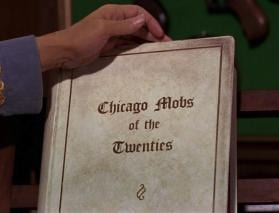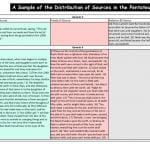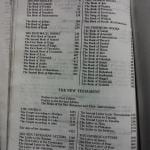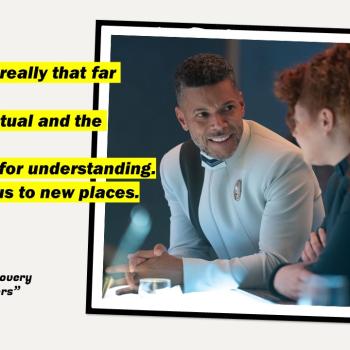 I’ve been rewatching the original series of Star Trek and as always have been taking notes on points I might return to in blog posts or other contexts, in particular things related to religion. My memories of the episode “A Piece of the Action” were largely the existence of a society patterned on Chicago’s mob wars in the 1920s. I had, however, not remembered how that society came to have those characteristics. There is a direct relevance to religion, and as I watched the episode while eating my lunch, it intersected with the class I had taught that morning on Abraham and his family and the subject of “biblical marriage” and “biblical family values.”
I’ve been rewatching the original series of Star Trek and as always have been taking notes on points I might return to in blog posts or other contexts, in particular things related to religion. My memories of the episode “A Piece of the Action” were largely the existence of a society patterned on Chicago’s mob wars in the 1920s. I had, however, not remembered how that society came to have those characteristics. There is a direct relevance to religion, and as I watched the episode while eating my lunch, it intersected with the class I had taught that morning on Abraham and his family and the subject of “biblical marriage” and “biblical family values.”
The Star Trek story involves a planet Sigma Iotia Two that had contact with explorers from Earth before the Prime Directive (here called the non-interference directive) was established. That contact, we soon learn, led to cultural contamination and influence. The Iotians are said to have an “imitative” tendency as well as being fast learners. The premise is that the earlier ship, the Horizon, left behind a book, which the Iotians now call “The Book” and may have on a reading stand much as one would a Bible. The analogy is not merely implicit. McCoy says it outright:
MCCOY: One book on the gangs of Chicago did all this. It’s amazing.
SPOCK: They evidently seized upon that one book as the blueprint for an entire society.
MCCOY: It’s the Bible.
Soon after that dialogue, Captain Kirk creates a diversion by explaining a card game he calls Fizzbin, which has ridiculous and arbitrary rules. I previously considered that just another bit of comedy in the episode, but on further reflection I think there is poignant symbolism in it. A game is a set of arbitrary rules, crafted to accomplish some end. If the rules are too arbitrary, one of the aims of playing games, namely having fun, is liable to be undermined, although err too far on the side of simplicity and it may not seem challenging enough. When a scripture is imposed as the rules of a society’s “game,” any number of effects are possible, positive or negative, depending on the contents of the texts in question.
However, what happened in this case, as with the Bible by analogy, is that an account of the way things once were is mistaken for a description of how things ought to be. The Iotians have clearly embraced the gangster values described in “The Book” (its title is Chicago Mobs of the Twenties), and so much of what they do may not feel like an imposition. Yet by the end of the episode we realize that the Iotians are capable of seeing how their way of life has inefficiencies and inconveniences. We might say it takes a revelation from the heavens (the Enterprise) to provide the necessary authority to bring about change. It also takes an intervention that communicates in the language and cultural idioms that the Iotians use, making that the starting point for effecting change. There is a lesson in that.
But the deep resonance for me was with the class I taught, in which I have asked students to read a story that involves or intersects with patriarchy, polygamy, slavery, concubinage, adultery, infertility and childbirth, and child sacrifice. Reading Genesis is not for the squeamish or faint of heart! The key thing I seek to help students to do is to recognize that, on the one hand, the challenges of survival in the pre-modern world, without social security, without modern medicine and science, made particular approaches to marriage and appeasing of deities seem to make sense. We do not need to agree, but in order to evaluate the stories and decide how we feel about them in an appropriate and fair way, we need to understand. If you were trying to find a way to ensure you have children who provide labor in the short term and care for you when you are too old to work yourself later on, certain institutions and practices may make sense that do not to us in the same way. That does not excuse or justify them. Likewise if your only explanation and possible recourse when confronted with drought or pandemic is to try to get whatever deity or deities is responsible to relent, the drastic action of offering them your firstborn child in the hope of ensuring survival for your other children and yourself may seem to make sense. We can understand the desperation, and need not approve in any way in order to do so. So far, so good. But if we take these texts and their depiction of what was as though it mandates what should be, we will have serious problems.
Students recognize right away that people today who talk about “biblical marriage” do not have Abraham’s story and his relationships in mind. The ideal of monogamy and a mutual commitment based on love are so far removed from the ancient world’s arranged marriages, exchanges of dowry and bride price, polygamy, concubinage, and the like, that it is hard to fathom how anyone can hear “biblical marriage” and think that is a slogan that accurately depicts marriage in the United States up until recently.
I also ask students to at least notice the patriarchal assumptions in the narrative. When Sarai is said to be “barren” it provides a natural introduction to an analogy for traditional patriarchal marriage. A farmer may own multiple fields, and plant his seed in them. No other farmer, on the other hand, may plant their seeds in some other farmer’s fields. The way that men and women are thought of in patriarchal marriage is analogous, and that is why a man may have multiple wives but a woman may not have multiple husbands within this framework.
There is more that I could say, but they key point at the intersection of this classic Star Trek episode and this classic biblical story is that a description of what was, mistaken for a mandate for what should or must be, can cause serious harm. The mistake is not with the text and its authors, but those who misunderstand the character and status of the text and turn it into something it should never have been.
That isn’t the only biblical connection in the episode. Kirk uses the phrase from Psalm 8, “out of the mouths of babes.” It is the child in question who utters the phrase that provides the title for the episode, “a piece of the action.” I am not sure what the scriptwriters had in mind with this additional biblical allusion. Perhaps it is a hint that children may prove more flexible than their parents. We certainly see this in relation to discussions of “biblical marriage” and “family values” in the present day. Younger people seem ready to move behind a framework arbitrarily imposed on their society, one built on mistaking an is (or more precisely as was) for an ought.
The story remains open-ended inasmuch as there is an insistence that the Federation (called “the Feds” in the episode, presumably as a result of the Iotians equating a group referred to in abbreviated form in “The Book” with the authority behind their otherworldly visitors) is taking over. This raises the question of whether working with the way things are and making a smaller adjustment, using a show of force and deception, are really the only way to bring about change. At the very end, McCoy realizes that he left behind a communicator, which his crewmates realize may allow the Iotians to make all kinds of technological developments as they inevitably take it apart and come to understand the workings of the “transtator,” said to be the basis of much Starfleet technology. If an outside influence could move things in the direction of a rigid emulation of 20th century mob wars, what could this piece of technology bring about as a form of influence? How does technology’s potential to radically alter a culture differ from the potential of a text deemed sacred to do so?
For more about “A Piece of the Action,” see Nique Yager’s hilarious visual review of the episode, highlighting some of the absurdities in the episode’s story in a truly entertaining way. See also the transcript of the episode.













